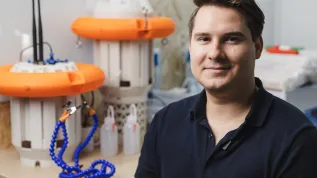
The European Research Council (ERC) announced the results of the Advanced Grants competition. 281 outstanding scientists from Europe will receive a total of EUR 721 million to carry out ambitious research projects under the Horizon Europe programme. The grants will also be awarded to four winners from Poland.
Advanced Grants winners receive EUR 2.5 million each to conduct research. Active scientists with documented significant research achievements can participate in the competition.
The largest number of grants will go to researchers working in the United Kingdom (56), Germany (35), Italy (25), the Netherlands (24) and France (23). In total, the grants will create approx. 2,700 new jobs in research teams.
Polish scientists won four grants.
Professor Cezary Galewicz from the Jagiellonian University will carry out the project 'Voices from the Deep South: the rise of Pāṭṭu song cultures of South Asia'. It involves research into the history of cultures in which pāṭṭu songs are performed, including those in southern India. 'Pāṭṭu is not just a song, it is a multitude of interconnected singing traditions, a unique galaxy of regional song cultures. Many of them draw on epic genres, from songs about heroes and places, verses intended to awaken a deity or cast a curse, to songs of ecstatic glory', Professor Cezary Galewicz describes his research interests.
Professor Joanna Mizielińska will lead a project at the University of Warsaw on queer (LGBTIQ*) families raising children in Central and Eastern Europe. In her research to date, Mizielińska has analysed queer everyday life, care practices, ways of defining and presenting families, queer parenting, homophobia in the family and interpersonal relationships at different stages of life. 'The project also takes into account different points of view, it combines the voices of LGBTIQ* families, their loved ones - families of origin, friends - activists and people who work professionally with families, allowing to capture the complexity of the everyday experiences of these families'," Professor Joanna Mizielińska adds.
Another grant was awarded to Professor Paweł Moskal from the Jagiellonian University for the project 'Can tissue oxygenation be sensed by positronium?' Professor Paweł Moskal is the inventor of the positronium imaging method and the creator of the Jagiellonian PET (J-PET) scanner. As part of the grant, he wants to investigate whether his machine can be used to determine the degree of cell oxygenation. If this hypothesis is confirmed, the J-PET scanner can be used for non-invasive examination of the degree of malignancy of tumours.
Professor Dominika Zgid at the University of Warsaw will test how to model disorder in crystalline materials. The project will produce a set of computational tools that will enable modelling disorder in realistic systems. The tools will enable the use of high-performance computing to reduce the number of expensive laboratory experiments, and help in the rational design of new, technologically important materials.
The competition attracted 2.5 thousand projects, and only one in nine was awarded a grant. Professor Maria Leptin, President of the European Research Council, said: 'Yet again, many scientists - around 260 - with ground-breaking ideas were rated as excellent, but remained unfunded due to a lack of funds at the ERC. We hope that more funding will be available in the future to support even more creative researchers in pursuing their scientific curiosity'.
The next call for applications for the Advanced Grants 2025 competition has already started; the deadline for submitting applications is August 28, 2025. A novelty in this edition of the competition is that scientists moving to Europe can receive an additional EUR 2 million to set up a laboratory - double the previously awarded amount. (PAP)
PAP - Science in Poland
lt/ zan/













